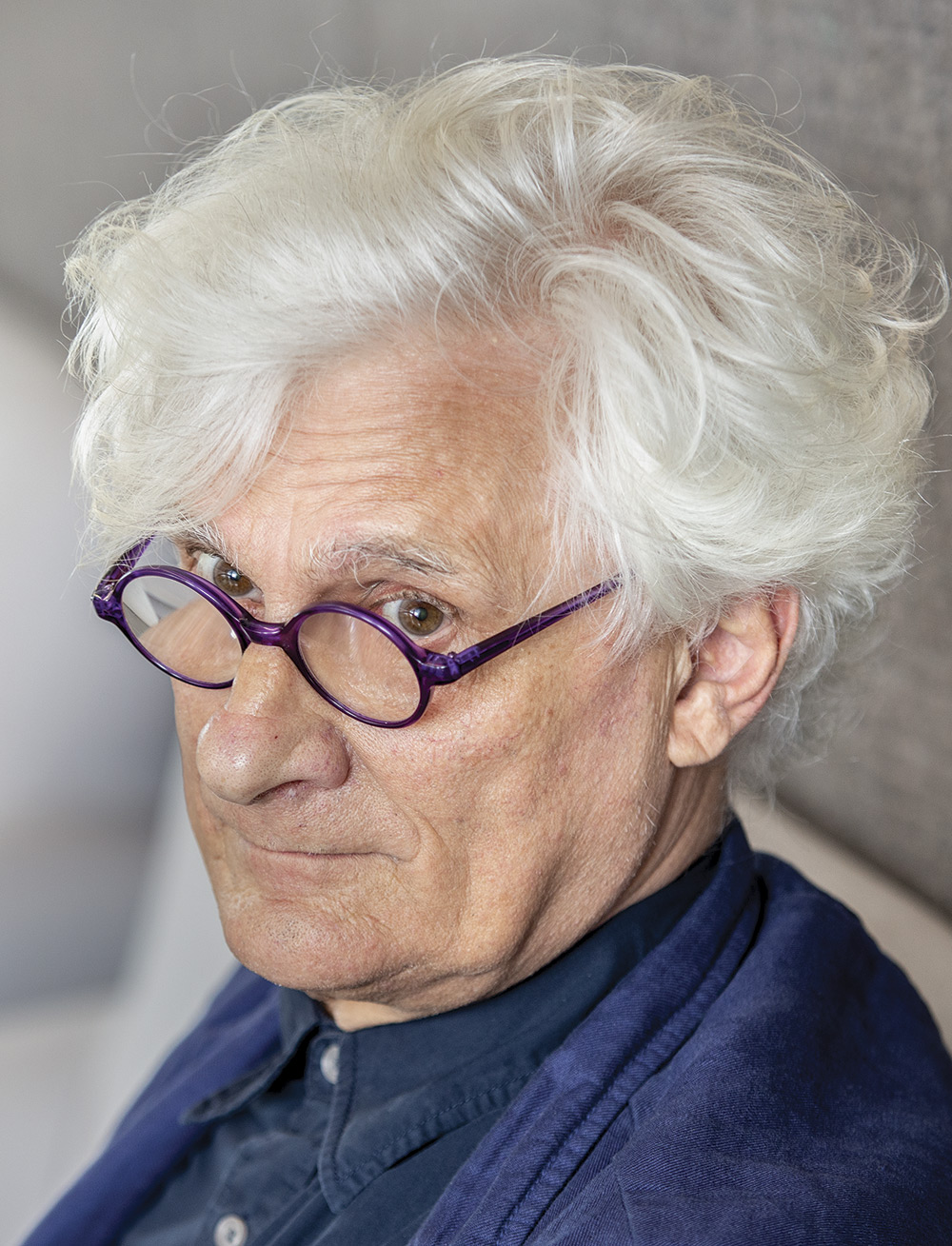"Capitalism constantly encourages desire, but always leaves the joy for later."
- Franco Berardi understood that young people had to fight capitalism and, although more than 40 years have passed since the protests of the students of Bologna, the Italian philosopher remains committed to claiming a more pleasurable life. But beware, because in his discourse, pleasure is not the same as hedonism. Enjoyment, to be a real buyer, has to be ethical and empathetic. In June he came to Donostia, and we took the opportunity to talk to him about all this.

Filosofoa. Gaztetan lotura handia izan zuen komunismoarekin. 1976an Radio Alice irratia sortu zuen, eta 1977an buru-belarri ibili zen Bolonian ikasleek egindako protesten mugimenduan. Polizia atzetik zebilkionez, Parisera joan zen, eta AEBetan ere bizi izan zen, 80ko hamarkadaren hasieran. Gaur egun, jaioterrian dihardu irakasle, baina hitzaldiak ematen ditu sarri han-hemenka. Sakon aztertu ditu komunikabideak eta teknologiaren zabalkundeak eta aurrerakuntzak gizakiengan izan duten eragina. Hogeitik gora saiakera argitaratu ditu.
In 1970 you published your first book: Contraillavoro [Against work]. The title has caught my attention. How do you see the subject of the work, now that it's been 50 years since that first book?
I recently tried to reread the book, and I didn't understand it because it was written in a classic, very complicated Marxist language. In any case, the main concept that appears in the book seems to me to be entirely current, much more urgent than 50 years ago. What does the claim against work mean? It means that we don't have to work anymore, but less, much less. And I'm not saying that alone. Two other people are far away from each other. One is Karl Marx, of course. 150 years ago he wrote a tremendously important text, “A Passage on Machines” – in the book Grundrisse – and Marx said that capital development increased productivity, and one of the consequences of fertility was that with less work more useful things were created. Thus, Marx said that the destiny of capitalism was to overcome it thanks to machines and technology.
Who is the other person?
It's Larry Page, Google's chief operating officer. In an interview in 2014, Google said that if Google launched all the technical artificial intelligence devices currently being developed, 50 percent of the current work could disappear overnight.
And is that good?
Is that good? Is it bad? It seems that the power of technology is to the detriment, which is a tremendous disgrace: no, it is an option, but capitalism cannot accept that possibility, because precisely exploiting the work of human beings is the basis of capitalist dynamics. So capitalism has created a superstition, the superstition of work, which is, if you want to eat, you have to work. This idea is a disaster, because as a result of this we are increasingly working and, therefore, more and more unemployed, more and more misery, more alienation, more suffering, more psychopathy, etc. It is not easy, of course, it is very difficult, but there is a solution: to reduce suddenly the time we dedicate to work and to devote more time to education, therapy, pleasure… to life.
"Our world is a small room. Most people suffer a lot, but we try not to see it. We are sick and not the others"
You mentioned therapy and I would now like to address it. You have said that psychotherapy or treatment of emotional and psychic stimuli has never been worked in a systemic or collective manner. Do you think we should change that perspective?
In the last century there were two distinct problems: on the one hand, the social problem, work, exploitation, workers’ rights… and on the other hand, the problem of the psychic state itself. The second problem, basically, was that of the bourgeoisie, were the individuals affected by neurosis, for various reasons, for example, by family or sexuality. Today, both problems persist, but the situation is more complicated, because both problems have been mixed, that is, today, even if there is psychic, whether individual, it cannot be understood or resolved individually, and the same happens with the problem of work and precariousness: this problem cannot be understood separately from psychic suffering. We must therefore create something, a technique, a practice or an art, to unite the two issues, the question of therapy and the question of transformation or social liberation. It's not easy, because we continue to believe that suffering is a lonely thing, but I think it's the only way out of the exploitation and suffering that we live today.
A system that fosters desire without pleasure: for you, this is capitalism.
We could say that capitalism fosters desire without ceasing, but without ever giving pleasure, on the contrary, it always leaves pleasure for later and forever. Capitalism forces you to produce and consume continuously, but never to enjoy. At the same time, the technological transformation that is taking place today is causing a great acceleration in the circuit of desire and always leaves the possibility of feeling pleasure for the future in a really painful way. The screens we know and use today, which are very varied, stimulate hyper desire and, at the same time, nullify pleasure, delay it forever. It is a central discourse about our time, but I believe that all of this has a remarkable influence on the realm of sexuality.

How?
A significant fact is that, according to the statistics of pharmaceutical companies, young people are the ones who most use the pills originally invented for the elderly, such as Viagra and other erection support pills. Why is that so? On the one hand, because young people know nothing about eroticism, because they have learned everything they know about the source of pornography, and because they believe pornography and eroticism are the same thing. Finally, and this is the most important thing, young people do not have time to express themselves and develop through language. After all, eroticism is a linguistic phenomenon, and if it is not understood, nothing will ever be understood. As the pace of consumption accelerates, the ability to develop desire through language is destroyed.
You've vindicated the ethics of empathy, the ethics of sensitivity rather than the ethics of the mind.
What does ethics mean? In one sense, in the history of philosophy, this issue has not yet been resolved. For example, Kant’s ethics, the ethics of modern and democratic society, which mainly talks about universal norms. These are interesting and good rules, but they are rules. If we consider ethics as normative, we maintain the cynical and anti-ethical character of social life. There are a number of things in social life: on the one hand, there is a need to accumulate money on a daily basis; on the other hand, there are rules that we must respect if we want or can; and, finally, there is a law that establishes an ethical standard. The law can be effective, because it uses repression, but that option is not very good. So what's the problem? Well, to put it through philosophy, the problem is the distinction between Eros and Agaper, that is, the distinction between desire and duty of kindness. As a consequence of this distinction, ethics has not been considered as something that belongs to the realm of pleasure. In this issue is at stake the body of the other: how we live the body of the other.
How do we live the body of the other?
It's a psychoanalytic problem. If we think that we can appropriate the body of the other, then the body of the other will not be part of our sensibility. If, on the contrary, we understand the body of the other through empathy, that is, that the body of the other is the continuation of our own body, then the pleasure of the other will be our pleasure and the suffering of the other will be our suffering. I don't mean utopia. If four people live in a small room, one of them suffers horribly: in that case, the people with it will suffer with the suffering of that person, and if not, it means that they are sick. We live in such a world, it's a small room and most people are suffering terribly, but we try not to see it. We are sick and not the others. I think it's a psychopathological problem in the background, so I'm not interested in normative morality, but something to cure the lack of empathy today.
I should like to ask you now about the future. You appear in Andre Gropplero's documentary Future Communism, and your latest book is called Futurability. It has drawn my attention: in both works the same concept, the future. How do you see what's coming?
The truth is, I'm not very optimistic. When we talk about the future, we don't talk about an imagined thing like this, no, we talk about the present, because the future is written in the present. And now, look at the map of the world, and I see how, from the Philippines to Brazil, racism and violent nationalism are spreading, and I think about myself that war is inevitable, that war is getting ready today. I also see how the effects of the ecological disaster are being manifested, and I see that the dominant political class pays no heed to it, that the ecological problem does not interest it, because its only concern is to boost economic growth, so I think in myself that the ecological apocalypse is inevitable. But, as Keynes said, it's the task of intellectuals to talk about the inevitable. And in any case, more than the inevitable, the unpredictable, which is what I hope for, what I cannot foresee.

And what is that?
For what cannot be predicted will not come simply from heaven, but what cannot be predicted comes from potency, from what can happen, perhaps it was difficult to foresee, but it is possible. The unpredictable cannot be impossible. So, today, what is unpredictable and at the same time possible? I call it communism. But that communism has nothing to do with Lenin, with the communism of war, with the Soviet Union and with the dictatorship of the proletarians. On the contrary, the axes of this communism are the redistribution of wealth, the reduction of working hours and the possibility of living a happy and ethical life at the same time, in the sense of ethics I mentioned earlier.
That is, the happiness of the few is not based on the suffering of many.
Exactly! This kind of happiness is not ethical or erotic.
These days in Donostia, you have known the situation of UBIK mediators. What do you think about this? [Since we did the interview, UBIK workers have reached an agreement and the strike is over].
I cannot speak of a labour dispute taking place in Donostia, because I do not live here and I do not know enough. In any case, I can say that we need intermediaries, and not just nine, we need a lot of intermediaries. What does the mediator do? It develops and channels conflict psychologically and through language. Conflict is spreading throughout history: ethnic conflict, social conflict, gender conflict, sexual conflict… In a situation like the one that is growing aggressiveness, we need an army of mediators. Mediators cannot be in a precarious situation, they cannot live without security, they need guarantees, they need decent wages and they have to be many. That is my proposal, and I am not referring directly to Tabakalera, but to the European public institutions. In my opinion, linguistic and cultural mediation should be a basic issue if we are to build a truly human and democratic Europe.
“Munduan gertatzen ari denak ez dauka inongo zerikusirik politikarekin. Politika existitzen zen garaian, arrazionaltasunaren arte bat zen: arrazionaltasun ona txarraren kontra, edo alderantziz, baina arrazionaltasuna azken batean. Nolanahi ere, gaur egun arrazionaltasuna desagertu egin da, finantzaren algoritmoarekin identifikatzen baita arrazionaltasuna orain. Denek arbuiatzen dute finantzaren algoritmoa, baina berdin sinesten dute hura dela arrazionaltasuna. Gaur egungo hiper-saturazio mediatikoak halako kaka-ekaitz bat sortu du, eta horren ondorioz, giza burmuinak ezin du arrazoiz funtzionatu, eta horregatik bozkatu du jendeak Trump ergel horren alde”.
“Houston, we have a problem!”
Well, to say that we have a single problem, as things are, can be a temerity, but this time I want to focus on an issue that concerns us and affects us internally, mental health.
Historically, suffering has had a profound meaning and meaning... [+]
























